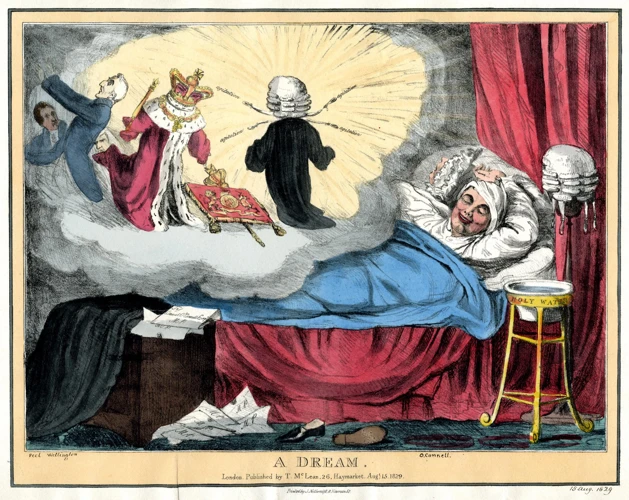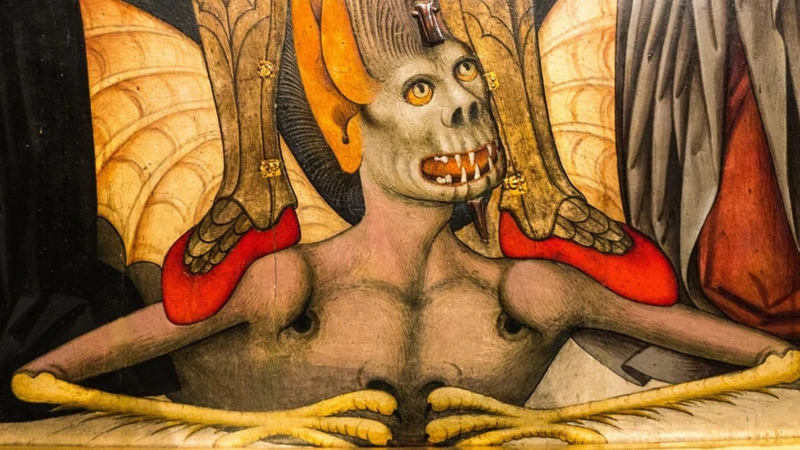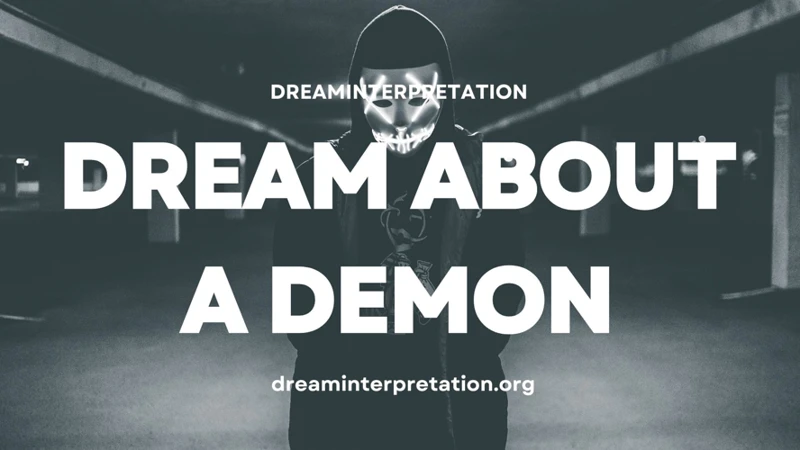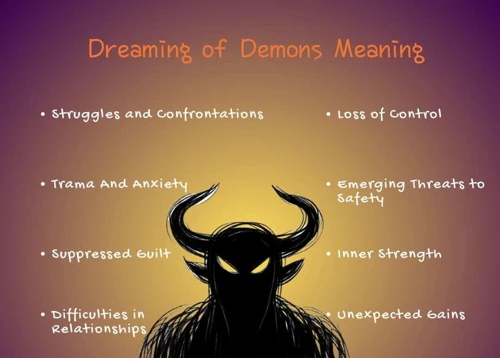Dreams have long been a source of fascination and mystique, offering glimpses into the hidden realms of our subconscious minds. Among the various dream motifs that provoke curiosity and perplexity, demons in dreams stand out as powerful and enigmatic symbols. These otherworldly entities have been depicted in a multitude of cultures and are often associated with fear, danger, and the supernatural. But what is the hidden meaning behind encountering demons in our dreams? In this article, we will delve into the symbolism of demon dreams, explore their historical and psychological interpretations, examine common types of demon dreams, and provide strategies for interpreting and coping with these unsettling nocturnal encounters. So, fasten your seatbelt and prepare to unravel the captivating mysteries that lie within the realm of demons in dreams.
The Symbolism of Demons in Dreams

Demons in dreams hold deep symbolic significance, reflecting the complex workings of our unconscious mind. The interpretation of these dreams varies depending on historical, cultural, and psychological perspectives. In many cultures, demons are seen as malevolent beings representing evil or temptation, while in others, they symbolize repressed desires or inner conflicts. Psychologically, demons in dreams can manifest as manifestations of fear, anxiety, or the shadow self—the darker aspects of our personality. The symbolism of demons in dreams often points towards suppressed emotions, personal challenges, or warnings. Each dreamer’s personal associations and experiences also play a crucial role in interpreting the meaning of demons in their dreams. To truly unravel the hidden messages behind these nocturnal encounters, it is necessary to explore both universal symbolism and the dreamer’s unique context.
1. Historical and Cultural Perspectives
When examining the historical and cultural perspectives surrounding demons in dreams, we unearth a rich tapestry of beliefs and interpretations. In ancient Mesopotamia, demons were viewed as supernatural beings that influenced human lives, often associated with illness or misfortune. In Christian traditions, demons are seen as fallen angels or evil spirits, representing temptation and the battle between good and evil. Hinduism portrays demons as powerful entities challenging the gods and hindering spiritual progress. Similarly, in Japanese folklore, oni are malevolent demons associated with various negative traits. The cultural and religious context shapes the perception of demons in dreams, influencing the way individuals interpret these symbolic encounters. Exploring the historical and cultural aspects of demons in dreams provides valuable insights into the diverse meanings attributed to these nocturnal manifestations.
2. Psychological Interpretation
Psychological interpretation of demon dreams delves into the depths of our subconscious mind. These dreams often represent the inner battles and conflicts we face on a psychological level. Demons can be seen as symbols of our fears, suppressed emotions, or repressed desires. They may embody aspects of ourselves that we are unwilling to acknowledge or confront. Dreaming about demons may indicate unresolved psychological trauma or the need to confront unresolved issues. These dreams invite introspection and self-reflection, encouraging us to explore our shadow self and face the darker aspects of our psyche. By understanding the psychological significance of demons in dreams, we can gain valuable insights into our own personal growth and development.
3. Personal Associations
Personal associations play a significant role in the interpretation of demons in dreams. While there are universal symbols and meanings attributed to demons, each individual brings their own unique experiences and associations to the dream realm. These personal associations can be influenced by past traumas, relationships, cultural background, and even individual fears or desires. For example, someone who has experienced rejection in their waking life may associate demons in their dreams with feelings of being unwanted or abandoned. Understanding these personal connections allows for a more comprehensive interpretation of the dream and can provide valuable insights into the dreamer’s subconscious landscape.
Common Types of Demon Dreams

Common demon dreams can take various forms, each carrying its own unique symbolism and significance. One common type is the dream of being chased or pursued by demons. In these dreams, the sense of fear and danger is heightened as the dreamer tries to escape the clutches of these malevolent beings. Another type is the dream of confrontation or battle with demons, where the dreamer may engage in intense struggles or fights against these supernatural entities. Possession or control dreams involve the dreamer feeling overtaken or manipulated by demonic forces, reflecting a sense of powerlessness or external control. Shapeshifting or transformation dreams depict the dreamer themselves turning into a demon or witnessing others transforming into demonic forms, often representing inner turmoil or a need for personal transformation. These common types of demon dreams provide intriguing insights into the inner workings of our subconscious and the challenges we face in our waking lives.
1. Chasing or Pursuit
One common type of demon dream is the experience of being chased or pursued. In these dreams, the dreamer often feels a sense of fear and urgency as they try to escape from a relentless pursuer. The symbolism behind this dream indicates that there may be unresolved issues or conflicts in the dreamer’s waking life. It could represent the feeling of being chased by responsibilities, expectations, or even unresolved emotions. This type of dream can also reflect a fear of being judged or rejected by others. The dreamer may feel overwhelmed and unable to confront these challenges head-on, leading to a constant feeling of being pursued. Exploring the emotions and triggers associated with this dream can provide valuable insights into the areas of life that require attention and resolution. If you want to learn more about the meaning behind dreams of rejection, you can read our article “What Does It Mean When You Dream About Rejecting Someone?“.
2. Confrontation or Battle
Confrontation or battle is a common theme in dreams involving demons. These dreams often depict intense struggles between the dreamer and the demonic figure. Symbolically, this type of dream may represent inner conflicts or the need to confront and overcome personal challenges. It can also reflect a power struggle or a manifestation of suppressed emotions or desires. The intense battle with a demon in a dream can serve as a metaphor for facing obstacles or adversities in waking life. Understanding the specific context and emotions experienced during the dream is key to unraveling its meaning. By exploring the symbolism and personal associations related to the confrontation or battle with demons in dreams, individuals can gain valuable insights into their own subconscious struggles and find ways to resolve them.
3. Possession or Control
Possession or control by demons in dreams is a common theme that can evoke feelings of helplessness and vulnerability. In these dreams, individuals often experience a loss of personal agency as they are taken over or manipulated by malevolent forces. The symbolism of possession or control can represent external influences exerting power over one’s life, such as toxic relationships or oppressive environments. It may also reflect internal struggles and conflicts, where the dreamer feels trapped or overwhelmed by their own emotions or negative traits. These dreams serve as a reminder to examine the areas in our lives where we may be giving away our power or allowing negative influences to dictate our actions. By recognizing and addressing these dynamics, we can reclaim our autonomy and break free from the grip of these symbolic demons.
4. Transformation or Shapeshifting
Transformation or shapeshifting is a fascinating theme that can be found in dreams involving demons. In these dreams, the demon may undergo a metamorphosis, changing its form or appearance. This symbolic transformation often represents a significant shift or evolution in the dreamer’s life. It could indicate a personal growth journey, a desire for change, or the need to adapt to new circumstances. Shapeshifting demons may also signify the dreamer’s own ability to transform and adapt in the face of challenges. This type of dream suggests a profound internal transformation, where the dreamer navigates their own fears and obstacles to emerge stronger and more resilient. Exploring the symbolism and context of the transformation in the dream can provide valuable insights into the dreamer’s current life situation and their capacity for personal growth and change.
Interpreting the Messages: What Does Your Demon Dream Mean?

Interpreting the messages behind demon dreams requires delving into the intricate layers of symbolism and personal context. These dreams often reflect underlying fears and anxieties experienced by the dreamer. The presence of demons may indicate a sense of fear or a need to confront and overcome challenges in waking life. Alternatively, demons can represent suppressed emotions or desires that need acknowledgment and exploration. They may also symbolize the shadow self—the aspects of our personality that we tend to repress or deny. It is vital to consider the individual’s own associations and experiences when deciphering the meaning of a demon dream. Keeping a dream journal and analyzing recurring themes or emotions can provide valuable insights. Seeking the guidance of a professional dream interpreter or psychotherapist specializing in dream analysis can also offer a deeper understanding of the messages hidden within demon dreams.
1. Fear and Anxiety
Fear and anxiety are common emotions associated with encountering demons in dreams. These dreams often serve as a reflection of our deepest fears and insecurities. The presence of demons can symbolize the anxieties and concerns that we may be facing in our waking lives, whether it’s related to our personal relationships, work, or general well-being. These dreams can be an indication that we are feeling overwhelmed or threatened by certain aspects of our lives, and our subconscious mind amplifies these feelings through the enigmatic imagery of demons. It is important to pay attention to the specific details and context of the dream to gain further insight into what may be causing these feelings of fear and anxiety. By recognizing and addressing these underlying emotions, we can take steps towards finding peace and resolution in our waking lives.
2. Suppressed Emotions or Desires
When demons appear in dreams, they often serve as powerful symbols representing suppressed emotions or desires. These dreams can act as a mirror to our unconscious, revealing aspects of ourselves that we may have repressed or ignored. The presence of demons may indicate unresolved feelings such as anger, jealousy, or lust that have been buried deep within our psyche. It is essential to pay attention to the emotions evoked during these dreams and reflect on the potential connections to our waking life. Exploring the symbolic meaning behind these suppressed emotions can lead to a greater understanding of our innermost desires and help us address any unresolved issues that may be holding us back. As Carl Jung famously stated, “Until you make the unconscious conscious, it will direct your life and you will call it fate.” So, embrace the opportunity to delve into the depths of your dreams and explore the hidden truths they may harbor.
3. Inner Struggles and Personal Challenges
Inner struggles and personal challenges are common themes that emerge when interpreting dreams featuring demons. These dreams serve as a reflection of our internal conflicts and unresolved issues. The manifestation of demons in our dreams can symbolize the battles we face within ourselves—the tug-of-war between our desires, fears, and aspirations. These nocturnal encounters may highlight the need to confront and overcome personal obstacles in order to achieve growth and self-transformation. The demons in our dreams may represent the aspects of ourselves that we perceive as challenging or threatening, urging us to confront and integrate these shadow elements into our conscious awareness. By navigating these inner struggles, we can emerge stronger and more resilient. So, next time you find yourself encountering demons in your dreams, consider it an invitation to delve deep into your psyche and conquer your personal challenges.
4. The Shadow Self
The concept of the shadow self plays a significant role in understanding the symbolism of demons in dreams. The shadow self, as coined by psychoanalyst Carl Jung, represents the hidden and suppressed aspects of our personality that we may disown or reject. When demons appear in dreams, they often embody these repressed qualities, urging us to acknowledge and integrate them into our conscious awareness. The shadow self can encompass our fears, insecurities, and even our deepest desires that we may find unacceptable or challenging to confront. Exploring the presence of demons in dreams can provide valuable insights into the shadow self, guiding us towards self-discovery, and personal growth. By embracing and integrating these shadow aspects, we can achieve greater wholeness and harmony within ourselves.
5. Warning or Caution
5. Warning or Caution:
Demon dreams can serve as cautionary messages, alerting us to potential dangers or pitfalls in our waking life. These dreams often create a sense of unease or fear, urging us to pay attention and take necessary precautions. The presence of demons in these dreams may symbolize imminent threats, hidden enemies, or situations that require immediate attention. It is important to analyze the specific details of the dream, such as the actions and behaviors of the demons, to gain further insight into the nature of the warning. For example, if the dream involves a confrontation with a powerful and menacing demon, it may indicate a significant challenge or obstacle on the horizon that requires careful navigation. By heeding these warnings, we can take proactive measures to protect ourselves and make informed decisions. Remember, these dreams are not to be dismissed but rather, serve as valuable signals prompting us to exercise caution and stay vigilant.
Coping Strategies for Dealing with Demon Dreams
Dealing with demon dreams can be unsettling and leave a lingering sense of unease. However, there are coping strategies that can help individuals navigate these intense dream experiences. Here are some effective approaches to consider:
1. Dream Journaling and Analysis: Keeping a dream journal can aid in capturing the details and emotions of demon dreams. Analyzing these dreams can provide insights into their underlying meanings and help identify patterns or triggers.
2. Lucid Dreaming Techniques: Practicing lucid dreaming techniques empowers dreamers to become aware that they are dreaming. This awareness can allow them to take control of the dream narrative and transform the encounter with the demon into a more positive or empowering experience.
3. Seeking Professional Help: If demon dreams significantly impact daily life or cause distress, it may be beneficial to seek guidance from a qualified professional, such as a therapist or dream analyst, who can provide support and explore the deeper psychological implications.
Implementing these coping strategies can assist individuals in confronting and understanding their demon dreams, ultimately leading to a sense of empowerment and personal growth. Remember, everyone’s experience with demon dreams is unique, so finding the coping strategies that resonate with you is essential to finding solace and peace in the face of these extraordinary dreams.
1. Dream Journaling and Analysis
Dream journaling and analysis is a powerful tool for unraveling the hidden meanings behind demon dreams. By keeping a notebook or digital record of your dreams, you can begin to identify recurring symbols, emotions, and patterns within your dreamscape. Recording the details of your demon dreams, such as the appearance of the demon, the setting, and your feelings during the dream, can provide valuable insights. In the process of analysis, you can look for connections between your dream content and your waking life experiences or emotions. This introspective practice allows you to delve deeper into the personal significance of your demon dreams and gain a better understanding of your inner psyche. Remember to be open-minded and non-judgmental during this process, as the meanings of your dreams may not always be literal. Anchoring this dream journaling practice with self-reflection can help unlock the hidden messages within your demon dreams and aid in personal growth and self-awareness.
2. Lucid Dreaming Techniques
Lucid dreaming techniques can be valuable tools for those seeking to gain control and understanding of their dreams, including those with demon-related experiences. Lucid dreaming is the ability to become aware that you are dreaming while still in the dream state. This awareness allows the dreamer to actively participate in and manipulate the dream narrative. There are several techniques that can enhance the likelihood of experiencing lucid dreams, such as reality checks, which involve questioning your surroundings to determine whether you are dreaming or awake. Another technique is keeping a dream journal, in which you record your dreams upon waking. This helps to improve dream recall and can facilitate lucidity. Additionally, practicing meditation and visualization exercises before sleep can increase self-awareness during dreams. Exploring lucid dreaming techniques not only empowers individuals to confront and transform their demons within dreams but also opens up a realm of limitless possibilities for self-exploration and personal growth.
3. Seeking Professional Help
Seeking professional help can be a beneficial step when dealing with the impact of demon dreams. Consulting with a therapist or dream analyst can provide valuable insights and guidance in understanding the underlying meanings of these dreams. These professionals have the expertise to explore the psychological and emotional aspects of the dreamer’s experiences and can help uncover any unresolved issues or traumas that may be contributing to the presence of demons in dreams. Additionally, they can offer coping strategies and techniques to manage and reduce the frequency or intensity of these dreams. If you find yourself deeply disturbed or overwhelmed by recurring demon dreams, /what-does-it-mean-when-someone-calls-you-a-dream/ seeking professional help should be strongly considered, as it can promote healing and provide a supportive environment for self-exploration and growth.
Conclusion
In conclusion, dreams featuring demons offer a fascinating glimpse into the depths of our subconscious minds. These symbolic manifestations can be interpreted through historical and cultural perspectives, psychological analysis, and personal associations. While demons in dreams often evoke fear and anxiety, they also provide an opportunity for self-reflection, understanding our suppressed emotions, and navigating personal challenges. It is crucial to approach these dreams with curiosity and open-mindedness, delving into their hidden meanings to gain insight and growth. If you’re intrigued by the world of dreams, you may also be interested in exploring the significance of dreaming about your boyfriend having a baby with someone else/what-does-it-mean-to-dream-about-your-boyfriend-having-a-baby-with-someone-else/.
Frequently Asked Questions
1. Why do we dream about demons?
Dreams about demons can be attributed to a variety of factors, including cultural influences, personal experiences, and psychological processes. They often serve as symbolic representations of fear, hidden desires, or inner conflicts that we may be facing in our waking lives.
2. Do demon dreams always have negative meanings?
While demons in dreams are often associated with negative connotations, they do not always have negative meanings. They can also represent aspects of ourselves that we are suppressing or denying, calling for self-reflection and growth.
3. Can demons in dreams predict real-life danger?
Dreams, including those involving demons, are not considered to be predictive of future events. However, they can serve as symbolic representations of our subconscious fears or potential warning signs to pay attention to certain aspects of our waking life.
4. What does it mean if I am chased by a demon in my dream?
Being chased by a demon in a dream can symbolize the pursuit of unresolved issues or repressed emotions. It may indicate that there are aspects of your life or yourself that you are trying to escape or avoid confronting.
5. Can demons in dreams be a reflection of my religious beliefs?
Dreams involving demons can be influenced by religious beliefs for those who hold them. However, the interpretation of such dreams is subjective and can vary based on individual perspectives and personal symbolism.
6. How can I differentiate between a regular dream and a demon dream?
Demon dreams can often be distinguished by the presence of powerful and unsettling figures or a sense of fear and chaos. The intense emotions and vivid imagery associated with demon dreams often set them apart from regular dreams.
7. Do demon dreams have any connection to paranormal experiences?
While demon dreams may involve supernatural elements, they are generally considered to be products of our subconscious mind rather than a direct connection to paranormal experiences. Their interpretation is rooted in psychology and symbolism rather than the supernatural.
8. Can I control the presence of demons in my dreams?
Controlling the presence of specific dream elements, including demons, can be possible through lucid dreaming techniques. With practice and awareness, you may be able to manipulate the dream environment and confront or manipulate the presence of demons.
9. How can I overcome the fear associated with demon dreams?
Overcoming the fear associated with demon dreams involves understanding and addressing the underlying emotions and psychological factors at play. Techniques such as dream journaling, therapy, and self-reflection can help in processing fear and reducing its impact on dream experiences.
10. Should I be concerned if I frequently have dreams involving demons?
Frequent dreams involving demons may indicate unresolved issues or emotional turmoil in your life. While it is normal to have unsettling dreams from time to time, if these dreams consistently cause distress or interfere with your daily functioning, seeking professional help is advisable.






